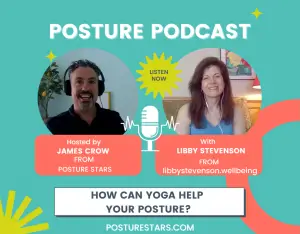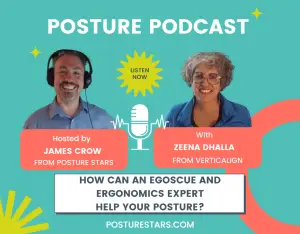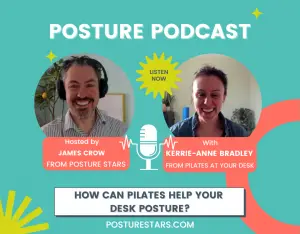Season 1 Episode 6
We talk to Lorna Taylor, a Physiotherapist who specialises in helping teachers and schoolchildren. Lorna was so dismayed by the state of teacher’s posture that she developed her own range of products to help, including the popular Jolly Back chair. Listen in as we discuss the hard times teachers have, and how they can be helped.
James Crow
Hey everybody, its James from Posture Stars. Thanks for tuning in. Today we’re talking to Lorna Taylor, physiotherapist and founder of Jolly Back. Lorna has been a children’s physiotherapist for over 15 years, and is now specialising in occupational health and ergonomics. I’m going to talk to her about posture in teachers and schools, which is a massive subject right now. Hello, Lorna.
Lorna Taylor
Hi, James. Thanks for having me on today.
James Crow
Oh, thanks so much for coming on. I’ve been really looking forward to speaking to you. You’ve got a real interest in the moment in teacher’s posture. Tell me what’s going on there.
Lorna Taylor
So I guess my interest in teacher’s posture came about from when I was working in schools in Derby city, going in looking at kids posture because more and more children are coming through with back problems now. And it was whilst in, that the teachers, as soon as people know you’re a physio, would often come up to me with the back, the hip, the knee problems.
James Crow
Oh are you a physio? Can I talk to you about my back problem, Lorna?
Lorna Taylor
Of course, after this James. I’m really interested in it. But yeah, some teachers lying on classroom floors during break time to stretch their back out and thinking that’s perfectly acceptable and normal whilst at work. So when we looked at their working practices in primary schools, there’s low height working everywhere, we’re never going to escape big people working with the little people, there will always be that height difference. Sitting in kids chairs, bending over tables, washing h ands in those sinks, you name it. They’re stooping over a lot of the day. It was then that I thought that I really need to be able to help a bit more here. And with my knowledge as a physio of ergonomics, I thought if we can improve the way they’re sitting, that will help a little bit. So that’s when I came up with the idea of the jolly back chair, just as a wedge seat, height, adjustable backrest on wheels, handles so they don’t have to bend or move it or pick it up. So safer for children because chairs aren’t being lifted overhead. And it went from there really, but I realise that’s a very reactive way to treat the problem. And so I do a lot more proactive, trying to raise awareness about teachers back health and working conditions. And it’s just gone from there really.
James Crow
I can’t believe how bad a time teachers have of it. In my private practice, maybe one fifth of my clients are teachers. I have a fifth of them are physios and massage therapists because physios are always getting broken, and a fifth are teachers. Is it because there are that many teachers in the country? Or is it because they’re having these poor working practices and things are going terribly wrong for them?
Lorna Taylor
Yeah, really interesting. You see a lot of teachers and I suspect a lot are coming in their own time and paying, self funding their treatments. We did some research with the University of Derby, looking at the incidence of musculoskeletal pain in teachers over five years ago now. Just to try and identify the need. Anecdotally, as you say, and others, you speak to teachers, they often say, “Oh, yeah, my back hurts at end of the day, or I hang off a doorframe”, somebody says, “to have a stretch out”. If you’ve got kids, you’ll know if you’ve been in a parent, same thing when you leave parents evening from the little chairs, how uncomfortable that feels. So teachers are aware, but they are very accepting that it’s part of the job, and they don’t really know what else to do about it. And I think the other factor amongst this is teachers are very well meaning and everything’s about the children. And when they say they’re going to work, they’re not really saying “when I’m at work”, it’s more “when I’m at school”. So I sometimes think that teachers don’t think that going to school is work. And maybe if that concept of them going to work was more ingrained within them, they might think actually hang on sitting on a kid’s hard plastic chair that’s 35 centimetres high as my work chair, they might think that, you know, that isn’t acceptable. I’ve even had teachers that have said, they’ve had to sign disclaimers when they’re working in primary in case the chair breaks because they’re not weight tested for adults. So rather than sort of say, “Well, what should I sit on?”, they just sign a disclaimer. It’s really tough for teachers. It’s accepted. It will take change, but I’m hoping certainly after the pandemic, well-being will be up there more so and schools, any organisation, is only as good as its staff and its employees. And if we think about schools, the output of schools is children’s education. So I really think there should be a massive shift to recognising the importance of teachers health and well-being and actually have that investment in staff. And hopefully then when it’s not so taboo that “oh my back’s sore” it will be talked about and then ideally prevented before before they need to come and see you James!
James Crow
Yes, before they need to come and see me and say “Oh my god back, I’m another teacher, come on fix me!” What a nightmare. Certainly in private industry, employers have a duty of care to look after their staff. Is that not the case in schools? Is it different?
Lorna Taylor
It is the case in schools. Absolutely. And there are practices in schools that, quite frankly, are illegal, but people don’t want to raise a fuss. And in nurseries I’ve been into I’ve had people in tears, saying they’ve spent £400 on private treatment, and mentioned it to their manager and have just been told that they can be replaced. So workplace culture is huge. And there are a lot of pressures on head teachers, nursery owners, nursery managers. I also think many that come into those positions or got promoted to those positions have been teachers themselves, and maybe haven’t had the leadership experience and their knowledge and awareness of knowing the benefits of investing in staff, and the outputs you can get from well-being an occupational health initiatives. So it’s not necessarily a blame, but it’s definitely something, a huge area that needs tackling. You look on ergonomics websites, and it’s to do with construction and healthcare, manufacturing, but but rarely see anything about education. Yeah, that’s something that I’m keen to change.
James Crow
Well you’re doing a great job of working on it. I really hope that you start to make inroads in this. To me, it’s really depressing when I see what’s happening with teachers, and particularly at the moment in early 2021, teachers getting a great deal of praise and support for how hard they’re working. And yet on the back end, the actual infrastructure supporting them has been terrible, if not negligent?
Lorna Taylor
Yeah, when you say, negligent, you look at teacher well-being posts on Facebook, Instagram, that type of thing, looking at their home working environments. Now, it’s not only a home working environment for a teacher, they are actually having to teach. And some of them are sitting on sofas with laptops on their lap, trying desperately hard to prop up a whiteboard behind them, so they display a board to teach. And I’d just be really interested to know what heads and school leaders have checked in, and how frequently with these teachers. Because there are solutions to this, there are products that can help, there is advice and awareness that can help. But when you see teacher’s working environments, they’re sitting at dining room tables with cushions stuffed in their back, some working on an ironing board, great that they’re standing up, but are they using that in a way to stand up or because there’s no other space? And yet you look at other companies, where they are authorising standing desks for that their staff working at home, or they’ve been able to take home, the DSE equipment because they’re not in the office, whereas teachers, I don’t know, I honestly think they’ve just have to get on and deal with it themselves. I don’t know if that’s because the heads are unaware of the legislation and the guidance of what they need to provide. I don’t know why they’re not providing it, I’m only thinking it’s because they’re not aware of what they need to do and how to do it. Rather than that they’re not carrying off their staff.
James Crow
When you said DSC equipment, then what that means is display screen equipment. And when these guidelines were set up, these were specifically for people using desk based CRT monitors. But teachers now a lot of their that display screen equipment may be a handheld mobile phone or a tablet propped up on something. Are those guidelines sufficient at the moment?
Lorna Taylor
I don’t think the guidelines that were already in place are known about in schools. From a DSE point of view, you’ve got teachers that will be using their laptops, or technology for more than an hour a day, but they won’t have how to do a DSE equipment assessment, which is, as we know, illegal. So I think if we haven’t got that level of awareness and procedure, pre-COVID, it’s unlikely to be happening during the pandemic. I guess the important thing is what happens after and certainly raising awareness for staff about what they can do now. And there’s plenty we you can do as we both know about improving your workstation, whilst you’re at home with equipment that you’ve got at home. I think key is getting up and moving. But I think it’s really, really important that teachers contact their manager or their lead or their health and safety lead, occupational health if they are uncomfortable or struggling at home or at school, because if they are struggling, their colleagues will be too and that often does help teachers because they think by saying something, they won’t be able to work and then it’ll put more strain and pressure on their colleagues. They’re very well meaning But actually, if teachers are themselves experiencing these problems, so will their colleagues So in other words, maybe if you don’t want to do it for you, and you should you’re entitled to, and you need to be responsible for your own health and well being. But if it’s easier to think I’m raising this as an issue to help my colleagues and future teachers coming through, then do it that way. But do let someone know, because no problem can be solved unless somebody knows about.
James Crow
Yeah, someone’s got to say something. Yeah. And often, it’s a tip of the iceberg thing for every one person who who has raised awareness there’s another 10 or 12 people behind them, who haven’t or who won’t,
Lorna Taylor
Yeah, and they’re willing for someone just to take them. Yeah. And it isn’t a case of school having to spend £1000s on height adjustable desks and such. It isn’t that at all. And it can be something you know, improving the working environment, looking up the air quality, and the temperature and the lighting and the design of the actual space and their setup. So to have better posture and health and well being isn’t a case, always of spending money. But actually, if you value your staff, you need to invest in them. And ultimately, they will be more productive. Teachers, I did have a case study with a school, once a member of staff had rheumatoid arthritis or chronic pain, and occupational health recommended a Jolly Back chair so we put that in. And the business manager could not believe the difference in the member of staff. She used to be a member of staff, shall we say, maybe not shouty is the right word. But she understandably was quite impatient with 30 4 year old children in a class if she was in pain, and you are more irritated. She said, since she’d had a chair and was more aware of her working set up, that no parent had been in to say, “she was a bit short with my child”. And she said the behaviour management was improved no end. And that’s something that I didn’t fully realise. But actually, it makes sense if people are comfortable and not in pain, they can concentrate on the job and they feel happier themselves.
James Crow
So better posture in teachers means happier teachers, means happier, better educated kids.
Lorna Taylor
Yeah. And posture to me isn’t just about standing up straight, it is integral.
James Crow
Well Lorna its funny, you should say “posture for me isn’t about” because I have a question for you, which is my first question that I ask all of my podcast people, which is “what is posture?”
Lorna Taylor
Well, to me it’s an integral part of health. And I don’t believe we can be fully healthy in terms of our physical and mental health without healthy posture. For me, it’s more about the self awareness of our bodies interacting with the environment, it improves our digestion, our circulation, our whole sense of well being. So that is his posture. To me, it’s a dynamic word. It isn’t just about let’s slump over and let’s sit up straight. It’s integral to our physical and emotional health.
James Crow
Yeah, absolutely. It’s an ongoing input into who and what we are as human beings and how we get through life. Very holistic of you Lorna!
Lorna Taylor
Well, it is, I think there’s lots of different camps isn’t there, and everyone has their own opinion. And that’s great. Different opinions, help create more ideas. And that’s brilliant. But I think we should try and get away from compartmentalizing different aspects of posture and ergonomics and mental health. It is one thing, it is joined up, one thing affects the other
James Crow
One great big chunk of well-being isn’t it, at the end of the day?
Lorna Taylor
Yeah. So in a way, if it’s like a win-win, isn’t it? If you’re thinking about your posture and awareness of your body, it’s gonna have benefits in other areas. So why wouldn’t you?
James Crow
Yeah, totally. I challenge our listeners. Totally. I challenge our listeners to come up with one reason why they wouldn’t want better posture. I’m struggling to find any. Maybe get more pestered by people thinking they’re more attractive also, that’s probably the only the only downside.
Lorna Taylor
Yeah, I’m not thinking about more attractive but yeah, I guess you would be if you’re more aware and happy with yourself. Yeah. shine more.
James Crow
Yeah, shining. People shine when they’re happy in themselves, and their posture reflects that. And then improving their posture can, as with your teacher colleague, can change how they are in themselves as well, their personality. Oh, that’s lovely. So my second question is, how do you improve people’s posture? What do you do?
Lorna Taylor
Well I guess for me, because posture is multifactorial, and I’m a huge advocate for moving, moving, moving, moving. So, to not sit down too long to know, you know, every 20 minutes properly get up and move for 20 minutes. But in that as well, make sure, certainly in these times, to look after your eyes as well. So you gaze 20 metres into the distance for 20 seconds. So thinking of this 20 20 20, because it’s much easier, we are creatures of looking for the path of least resistance. It’s much easier if we have points to remember. So just think every 20 minutes, I’ve got to move and look in the distance. So I think movement is fundamental, knowing that we can work in different positions, we haven’t just got to be sat at a desk and chair, we can stand up, we can lie down, we can sit cross legged, or one leg up in your chair – just just to move. So I’m very conscious of that, I bring to how can we people’s posture, I’ve obviously developed the Jolly Back chair and also now fortunate to be in a position to develop a range of other products to help teachers, focusing on the health and well-being, the safety of themselves and the children they’re working with. And just trying to raise awareness through working with the University of Derby, the Early Years Alliance, that actually, the health and well-being of teachers will benefit the children you’re teaching and caring for and trying to go down that angle, because teachers and people working with children are so well meaning and the children are everything. But actually trying to say that you can’t give if you aren’t, well, fit yourself. So that’s the kind of thing I’m doing to hopefully help people.
James Crow
So if any of our listeners at home, have been sat down for more than 20 minutes. Yeah, just get out of your chair. Now. Turn this nonsense off and go and have a walk and come back and turn it on again.
Lorna Taylor
Well actually, listen to this nonsense and walk around the house or if you’re able to walk around, move, just move however you can.
James Crow
Yeah, and give your eyes a rest as well, go and be nosy and see what the neighbours are doing. Yeah, it’s healthy to be nosy about your neighbors.
Lorna Taylor
Go and look for a healthy snack in the fridge.
James Crow
Yeah, just don’t have peanut butter on toast like I did before this this podcast, or you will still be suffering like I am. Okay so you’re helping people, teachers, in particular, with their posture by providing products and resources for them as well.
Lorna Taylor
Yes, we also, thinking about that off the top of my head as well, we found a range of manual handling trainers, because the other crazy thing is a lot of undergraduates and teachers and certainly, nursery workers training are going to work with children, but yet they’re not shown how to safely move and carry children for their health and also for the child’s health. So we’ve got a range of manual handling advisors around the country that will offer practical advice on how best to carry children therapeutically, position them for play, that you can access through the Jolly Back website as well.
James Crow
That sounds fantastic that’s jollyback.com It’s an interesting name.
Lorna Taylor
I thought at the time, I was on maternity leave going slightly mad with the third one when I had the idea, doing my schools work prior to maternity. And my eldest daughter was five at the time. And we were thinking of ideas for names and she had the idea of Jolly Back because she said they were learning Jolly phonics at school, and it’s kind of happy and fun. And so that’s where the name came from actually.
James Crow
I have to say, since I ever first heard the name, I’ve never forgotten it, which can’t be said of a lot of products out there. So it is it is easy to remember.
Lorna Taylor
Thank you.
James Crow
My third question is, and we might have answered this already, for our listeners at home, if you had to do one thing right now to improve your posture. What would that be, Lorna?
Lorna Taylor
It would be to be self aware of the posture that you’re currently in, the position you’re currently in, and think about how you can improve it. Can you move to a different position? Just be aware of your body and your your posture when you’re moving around.
James Crow
There are loads of ways you can improve body awareness peeps, you can do various modalities, physical stuff like yoga, Pilates, Alexander Technique. Mindfulness is a nice way of becoming more aware of your posture, listening to podcasts, from Posture Stars, and subscribing to our mailing list is a great way to ensure that your posture is permanently at the top of your mind. So many ways. We mentioned kids and moving in school and I’d really like to do another podcast where we talk about kids posture in school and also when kids are doing their homework working from home. Is that something that we’d be able to work with?
Lorna Taylor
Yeah, absolutely. James happily helped with that. There’s lots of advice that parents and carers can do with the children at home using the equipment that they’ve got, right up to looking at workstations for children and such, like. So again, it’s pretty endless. And I think as parents, we are a lot more conscious of our children, hunching over devices and working for hours in recent months. And although they will be back to school very soon, hopefully, home working and home studying will continue for all the years they’re in education. And I think, importantly, we should be setting our kids up with early habits as they go into the workforce. There’s quite a lot of work coming out of Europe at the minute looking at the future generation, because a lot of young people are entering the workplace with pre existing back and neck problems. And also, that’s obviously not great for the individual, but actually quite costly for employers. So they’re wanting to look at health of younger people in schools as well.
James Crow
This is terrible because these these are the kids who are going to be paying for my pension in retirement, so I’m not having them taken time off work with bad backs and bad necks, we need to get working on it. Thanks for that, Lorna. Okay, so Lorna Taylor of Jolly Back, that has been really informative. We’ve learned a lot about teachers and the problems they’re having with their posture. And I’m sure to have you back and we’ll discuss kids posture as well both at school and importantly for parents when they’re doing their homework. Thank you so much for coming on. I’ve really enjoyed our time together.
Lorna Taylor
Oh, you’re welcome. Thank you.




